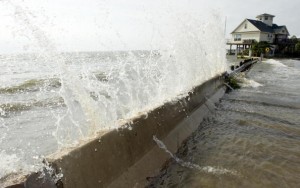Can Green Roofs Work in Texas?
It’s a novel idea — plants, shrubs and flowers, grown on the roof of urban buildings. The plants help cool surrounding air and provide insulation during both hot and cool temperatures.
But there’s a catch.
It’s a novel idea — plants, shrubs and flowers, grown on the roof of urban buildings. The plants help cool surrounding air and provide insulation during both hot and cool temperatures.
But there’s a catch.
A few years back, Lance Armstrong was caught. He apologized, admitted the error of his ways, and promised to do better in the future. His offense? Using too much water.
Armstrong had used 330,000 gallons of water in July 2008. He hadn’t even been home at his three acre, 14,475 square foot estate. “I’m a little shocked,” he told The New York Times at the time. “There’s no justification for that much water. I need to fix this.”
Well, it’s been several summers since then, this last one being notable for being the hottest and driest on record. And the city is in stage two watering restrictions because of the historic drought. But it would appear Armstrong has not learned how to conserve. According to data from Austin Water Utility, he used around 1.3 million gallons of water in the last year, putting him among the top ten residential users of water in town.
The record single-year drought afflicting Texas farmers had destroyed crops, decimated yields, and caused prices to rise. The obvious question: How will the farmers survive?
Enter USDA crop insurance, a lifeline during this year’s drought:
More than 41,000 distressed Texas farmers have received $1.65 billion so far from the national crop insurance program to help compensate for disastrous low yields and other damage caused by the state’s worst drought in history.
Though experts say the amount covers only about a third of the agricultural losses across the state, it may help some survive.

Dave Einsel/Getty Images
That’s a direct quote from Andy Saenz, spokesman for the Texas Commission on Environmental Quality (TCEQ). He’s referring to an article on rising sea levels by Rice University Professor John Anderson that was supposed to be part of a larger report on the Galveston Bay, “State of the Bay 2010,” by the TCEQ.
So what was wrong with the article in question, according to the TCEQ? You can read it right here, with notable deletions by the commission of phrases such as “due mainly to direct human intervention” and “impacts of global climate change:”
So the TCEQ didn’t like these references to human impact and climate change. Anderson, the Rice Professor, didn’t appreciate their efforts to delete them, so he leaked the article to reporters. This led to the TCEQ removing the article entirely:
Commission spokesman Andy Saenz said Anderson prematurely revealed the draft report to the media without prior approval, and that the commission did not want to include controversial implications about global warming in the report.
Two co-editors of the project, Jim Lester and Lisa Gonzalez, scientists with the Houston Advanced Research Center, a nonprofit research facility contracted for the report, asked the agency to remove their names, fearing their own credibility.
While the Obama administration is under fire for funding solar panel disaster story Solyndra, a Yale professor has another idea: stop funding risky ideas, and start rewarding innovative successes:
Dr. Pogge has proposed the creation of an Ecological Impact Fund, [which] would explicitly link the accessibility of an innovation to its value…
While much green technology today is financed through “push” funding, with governments and grant-making organizations deciding who should receive money, the Ecological Impact Fund would shift the model to market-based “pull” funding that rewards the most successful innovators.
Financed by participating national governments, the fund would rank companies that sign up on the basis of the ecological impact, or benefit, of their innovation. The criteria for judging innovations would be established by a panel of experts from the public and private sectors. Each year, innovators would receive a return based on their ranking, and a product would remain in the reward pool for 10 years.
Read the rest of the New York Times piece here.

Ethan Miller/Getty Images
Rick Perry is busy campaigning across the country, generating headlines for giving Mitt Romney the evil eye, proposing a flat tax, and calling opponent Herman Cain “brother.” But back home in Texas, his state is dry, cracked and at times burning during a drought that “is likely to be one of the ten costliest natural disasters in recent U.S. history.” Richard Parker argues that “Texans need our governor back home. Now:”
“The scale of this drought is nothing short of colossal. It is the worst one-year drought in over 100 years of record-keeping, according to John Nielsen-Gammon, the state meteorologist in College Station. A landscape the size of Connecticut has been blackened by fire; the recent Bastrop fires created a plume of smoke so massive it looked like an atomic weapon had been detonated south of Austin. Ranchers drive thirsty cattle to water—only to watch them bloat up and die from drinking too fast. Forced to sell herds early, they are incurring billions in losses and losing the very DNA of their livestock, forcing them to start from scratch next season if they can afford it.
It is the drought’s economic damage, however, that is now beginning to uncoil like a rattlesnake in the tall grass. Officially, direct agricultural losses have amounted to $5 billion. But Ray Perryman, one of the most respected economists in Texas, told me that direct losses will mount to about $7 billion before this year is even over. And the damage by no means stops there; ranchers and farmers are insured for some losses—but often highly leveraged. Perryman estimates that the multiplier effect—farm equipment, seed, fuel, consumer products not purchased as a result—will bring the indirect losses to a staggering $24.5 billion when 2011 draws to a close.”
As the drought shows few signs of abating, some folks in Abilene are turning to less conventional means of finding water, according to the Los Angeles Times:
Powell, 59, learned to dowse for water more than 40 years ago from an old “water witcher” known simply as Mr. Ray. Now Powell runs a dowsing and drilling business, Diversified Water Well Drilling, and carries a notebook filled with the lengthening list of those seeking his services. Demand has skyrocketed in recent months here, about 180 miles west of Dallas, and statewide, fueled by the ongoing drought, heat wave and a boom in hydraulic fracturing, or fracking, a type of oil drilling that requires lots of water.

AFP / Getty Images
An Austin oil company became a small part of the Norwegian government today. Brigham Exploration, an Austin company with about 100 employees, was purchased by Statoil, a Norwegian energy company, for over four billion dollars cash.
“I think the reaction by investors is one of surprise because many did not see the company selling themselves this early,” says Anish Patel, Managing Director of International Strategy and Investment in New York. “A lot of the deals we’ve seen to date have been more focused on natural gas — this really marks the first large scale deal for oil shale.” Continue Reading

Scott Olson/Getty Images
The current drought is wreaking havoc on crops, cattle and lawns. A five-part series in the Statesman this week looks at the extreme effects this dry period is having on Texans across the state. The hardest hit? Farmers and ranchers, with a total economic agricultural loss estimated to be $8.7 billion, according to the Texas A&M System’s AgriLife Extension Service. Will ranchers ever recover? Even if the drought ends next year, it doesn’t look good:
A U.S. Department of Agriculture report this month rates 96 percent of Texas pastureland in poor or very poor condition.
It’s not likely to get better any time soon, observers say. It’s going to take years. If ever. And there’s no telling how many of the state’s 149,000 beef producers will decide they’ve had enough.
“It’s just fighting depression,” said Casey. “For the first time in my life, it wasn’t fun to go out and feed the cows. And then every week I took a load of cattle to Fredericksburg, just a few at a time.”
It’s a little known fact: Texas is the only state that grows all four types of peanuts, and is second only to Georgia in peanut farming. Unfortunately, this year’s extreme drought is taking a toll on West Texas peanut farmers.

Scott Olson/Getty Images
Calvin Trostle is with Texas A&M Agrilife Extension in Lubbock, where most Texas peanuts are grown. This year, he’s seeing something he never has before. “This is a shock to us, to think that we could have an irrigated crop in the Texas High Plains fail,” he says, “but we’ve had some acres of peanuts out here that eventually, as we got further into the season, we saw we simply did not have enough water.”
Even with extra irrigation, peanut farmers were short 10 to 12 inches of water this year, and the crops are suffering. Plants that appeared healthy at first are turning out to have no peanuts under them. Jimbo Grissom grows peanuts south of Lubbock. His farm went 440 days without rain, and that’s come with a heavy cost.
“I’ve never seen one, even a lot of the people that live around here, have never seen a crop year like this one’s been. Even back in the ‘40s and ‘50s, whenever we had the Dust Bowl, it wasn’t even this dry,” he says.
The cost of extra water, combined with lower yields, adds up to prices that are about three times higher than last year. It won’t be long before higher bulk prices result in peanut butter costing more at the store. Continue Reading
StateImpact seeks to inform and engage local communities with broadcast and online news focused on how state government decisions affect your lives.
Learn More »